Evaluating AI Potential in Power Distribution System Planning
VerifiedAdded on 2022/08/16
|19
|4935
|18
Project
AI Summary
This project investigates the potential of artificial intelligence (AI) in power distribution system planning. It begins with an introduction to the importance of consistent electricity supply in modern society and highlights the role of AI in addressing challenges related to power system control, planning, and forecasting. The paper provides a literature review covering the concepts of AI and power distribution system planning, emphasizing the need for AI in power systems. It explores various AI techniques, including artificial neural networks, fuzzy logic, expert systems, and genetic algorithms, along with their applications. The research methodology outlines the research philosophy, approach, design, strategy, data collection, and analysis methods. The project aims to evaluate the potential of AI in power distribution system planning, addressing research questions related to the concepts, needs, techniques, and applications of AI in system operation control. The significance of the research lies in the ability of AI to improve the efficiency and reliability of power distribution systems, offering faster and more robust solutions compared to traditional methods. The assignment is a project submission for the University of Derby, as part of a coursework assessment.
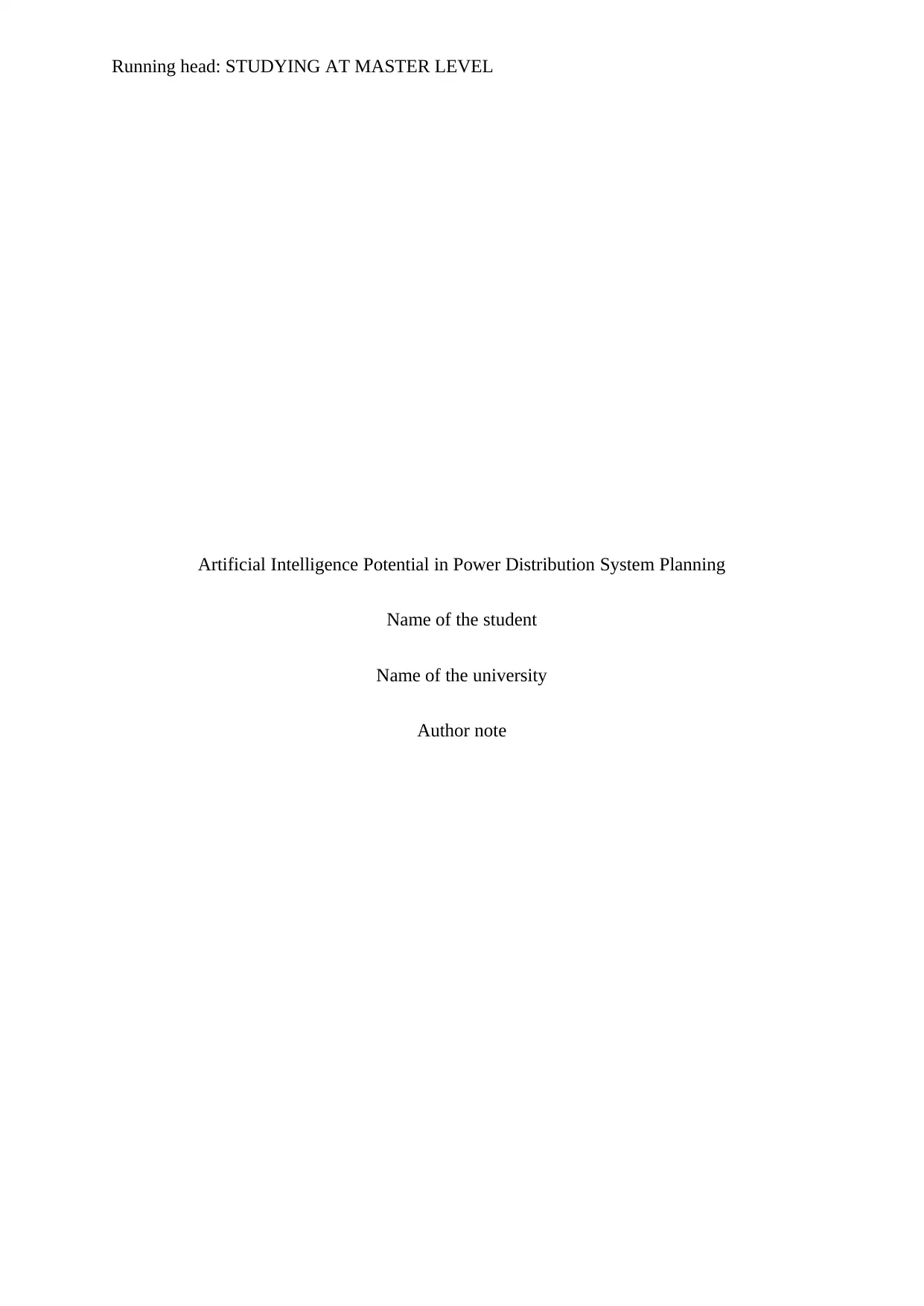
Running head: STUDYING AT MASTER LEVEL
Artificial Intelligence Potential in Power Distribution System Planning
Name of the student
Name of the university
Author note
Artificial Intelligence Potential in Power Distribution System Planning
Name of the student
Name of the university
Author note
Paraphrase This Document
Need a fresh take? Get an instant paraphrase of this document with our AI Paraphraser
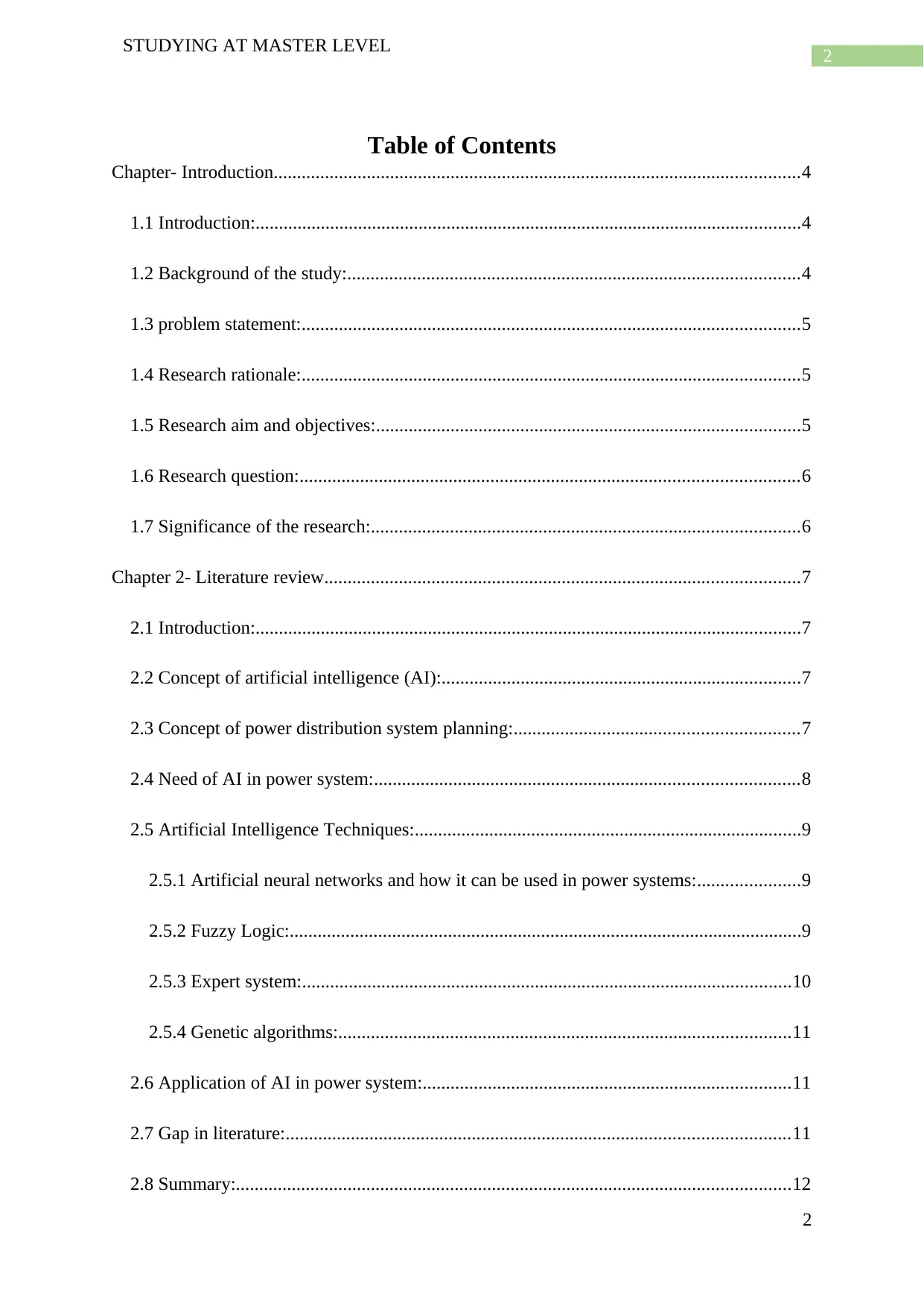
2
STUDYING AT MASTER LEVEL
Table of Contents
Chapter- Introduction.................................................................................................................4
1.1 Introduction:.....................................................................................................................4
1.2 Background of the study:.................................................................................................4
1.3 problem statement:...........................................................................................................5
1.4 Research rationale:...........................................................................................................5
1.5 Research aim and objectives:...........................................................................................5
1.6 Research question:...........................................................................................................6
1.7 Significance of the research:............................................................................................6
Chapter 2- Literature review......................................................................................................7
2.1 Introduction:.....................................................................................................................7
2.2 Concept of artificial intelligence (AI):.............................................................................7
2.3 Concept of power distribution system planning:.............................................................7
2.4 Need of AI in power system:...........................................................................................8
2.5 Artificial Intelligence Techniques:...................................................................................9
2.5.1 Artificial neural networks and how it can be used in power systems:......................9
2.5.2 Fuzzy Logic:..............................................................................................................9
2.5.3 Expert system:.........................................................................................................10
2.5.4 Genetic algorithms:.................................................................................................11
2.6 Application of AI in power system:...............................................................................11
2.7 Gap in literature:............................................................................................................11
2.8 Summary:.......................................................................................................................12
2
STUDYING AT MASTER LEVEL
Table of Contents
Chapter- Introduction.................................................................................................................4
1.1 Introduction:.....................................................................................................................4
1.2 Background of the study:.................................................................................................4
1.3 problem statement:...........................................................................................................5
1.4 Research rationale:...........................................................................................................5
1.5 Research aim and objectives:...........................................................................................5
1.6 Research question:...........................................................................................................6
1.7 Significance of the research:............................................................................................6
Chapter 2- Literature review......................................................................................................7
2.1 Introduction:.....................................................................................................................7
2.2 Concept of artificial intelligence (AI):.............................................................................7
2.3 Concept of power distribution system planning:.............................................................7
2.4 Need of AI in power system:...........................................................................................8
2.5 Artificial Intelligence Techniques:...................................................................................9
2.5.1 Artificial neural networks and how it can be used in power systems:......................9
2.5.2 Fuzzy Logic:..............................................................................................................9
2.5.3 Expert system:.........................................................................................................10
2.5.4 Genetic algorithms:.................................................................................................11
2.6 Application of AI in power system:...............................................................................11
2.7 Gap in literature:............................................................................................................11
2.8 Summary:.......................................................................................................................12
2
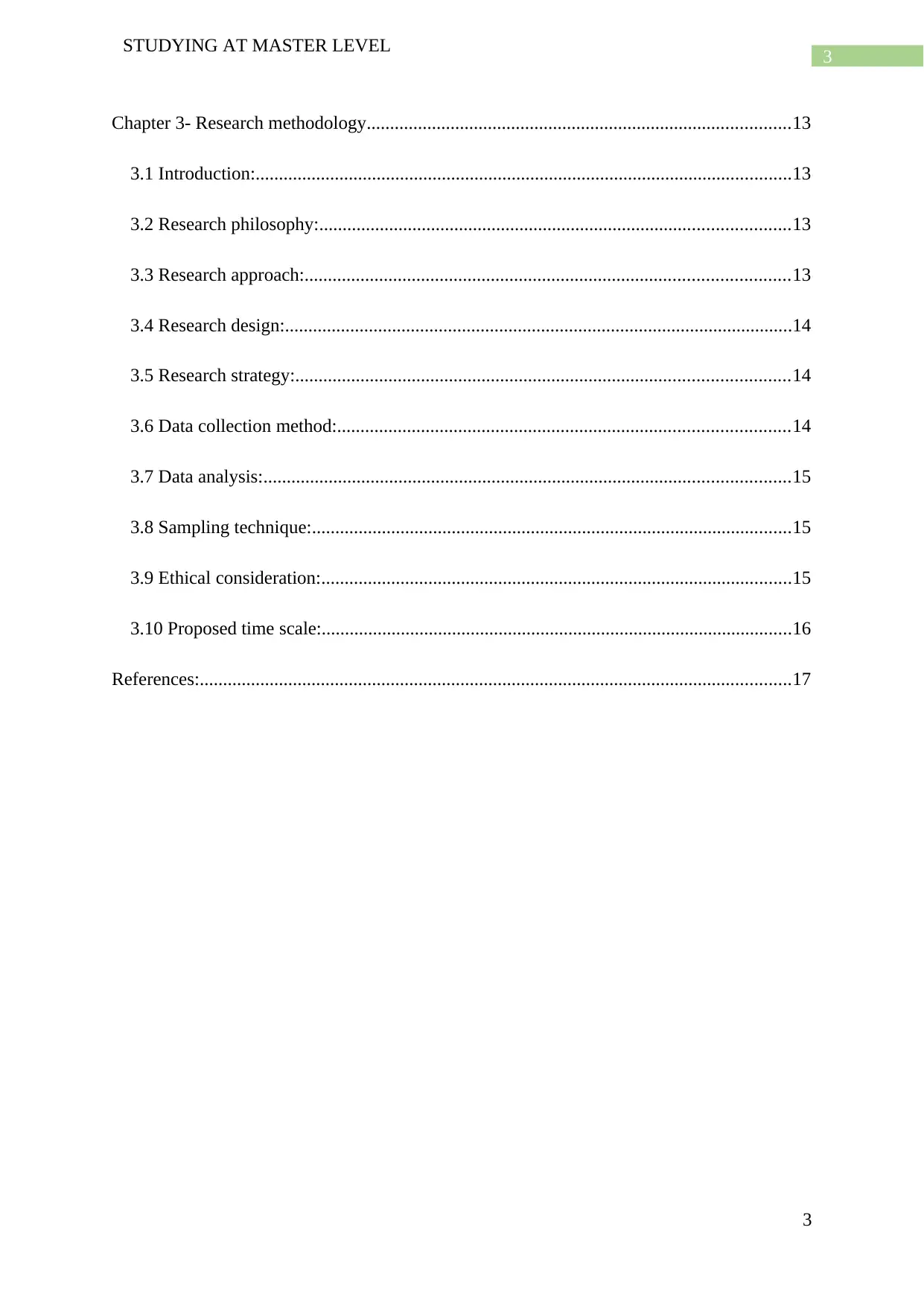
3
STUDYING AT MASTER LEVEL
Chapter 3- Research methodology...........................................................................................13
3.1 Introduction:...................................................................................................................13
3.2 Research philosophy:.....................................................................................................13
3.3 Research approach:........................................................................................................13
3.4 Research design:.............................................................................................................14
3.5 Research strategy:..........................................................................................................14
3.6 Data collection method:.................................................................................................14
3.7 Data analysis:.................................................................................................................15
3.8 Sampling technique:.......................................................................................................15
3.9 Ethical consideration:.....................................................................................................15
3.10 Proposed time scale:.....................................................................................................16
References:...............................................................................................................................17
3
STUDYING AT MASTER LEVEL
Chapter 3- Research methodology...........................................................................................13
3.1 Introduction:...................................................................................................................13
3.2 Research philosophy:.....................................................................................................13
3.3 Research approach:........................................................................................................13
3.4 Research design:.............................................................................................................14
3.5 Research strategy:..........................................................................................................14
3.6 Data collection method:.................................................................................................14
3.7 Data analysis:.................................................................................................................15
3.8 Sampling technique:.......................................................................................................15
3.9 Ethical consideration:.....................................................................................................15
3.10 Proposed time scale:.....................................................................................................16
References:...............................................................................................................................17
3
⊘ This is a preview!⊘
Do you want full access?
Subscribe today to unlock all pages.

Trusted by 1+ million students worldwide
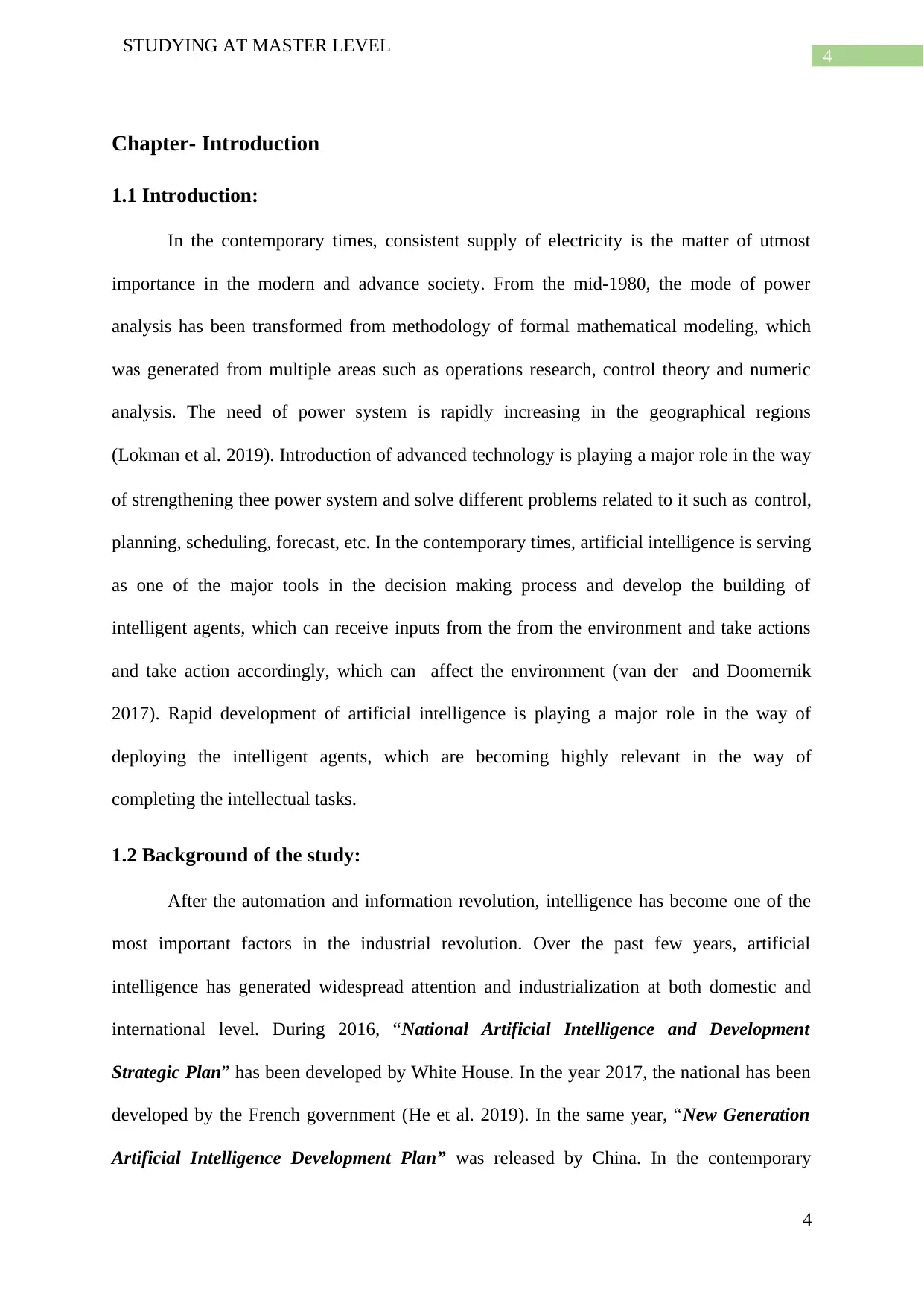
4
STUDYING AT MASTER LEVEL
Chapter- Introduction
1.1 Introduction:
In the contemporary times, consistent supply of electricity is the matter of utmost
importance in the modern and advance society. From the mid-1980, the mode of power
analysis has been transformed from methodology of formal mathematical modeling, which
was generated from multiple areas such as operations research, control theory and numeric
analysis. The need of power system is rapidly increasing in the geographical regions
(Lokman et al. 2019). Introduction of advanced technology is playing a major role in the way
of strengthening thee power system and solve different problems related to it such as control,
planning, scheduling, forecast, etc. In the contemporary times, artificial intelligence is serving
as one of the major tools in the decision making process and develop the building of
intelligent agents, which can receive inputs from the from the environment and take actions
and take action accordingly, which can affect the environment (van der and Doomernik
2017). Rapid development of artificial intelligence is playing a major role in the way of
deploying the intelligent agents, which are becoming highly relevant in the way of
completing the intellectual tasks.
1.2 Background of the study:
After the automation and information revolution, intelligence has become one of the
most important factors in the industrial revolution. Over the past few years, artificial
intelligence has generated widespread attention and industrialization at both domestic and
international level. During 2016, “National Artificial Intelligence and Development
Strategic Plan” has been developed by White House. In the year 2017, the national has been
developed by the French government (He et al. 2019). In the same year, “New Generation
Artificial Intelligence Development Plan” was released by China. In the contemporary
4
STUDYING AT MASTER LEVEL
Chapter- Introduction
1.1 Introduction:
In the contemporary times, consistent supply of electricity is the matter of utmost
importance in the modern and advance society. From the mid-1980, the mode of power
analysis has been transformed from methodology of formal mathematical modeling, which
was generated from multiple areas such as operations research, control theory and numeric
analysis. The need of power system is rapidly increasing in the geographical regions
(Lokman et al. 2019). Introduction of advanced technology is playing a major role in the way
of strengthening thee power system and solve different problems related to it such as control,
planning, scheduling, forecast, etc. In the contemporary times, artificial intelligence is serving
as one of the major tools in the decision making process and develop the building of
intelligent agents, which can receive inputs from the from the environment and take actions
and take action accordingly, which can affect the environment (van der and Doomernik
2017). Rapid development of artificial intelligence is playing a major role in the way of
deploying the intelligent agents, which are becoming highly relevant in the way of
completing the intellectual tasks.
1.2 Background of the study:
After the automation and information revolution, intelligence has become one of the
most important factors in the industrial revolution. Over the past few years, artificial
intelligence has generated widespread attention and industrialization at both domestic and
international level. During 2016, “National Artificial Intelligence and Development
Strategic Plan” has been developed by White House. In the year 2017, the national has been
developed by the French government (He et al. 2019). In the same year, “New Generation
Artificial Intelligence Development Plan” was released by China. In the contemporary
4
Paraphrase This Document
Need a fresh take? Get an instant paraphrase of this document with our AI Paraphraser
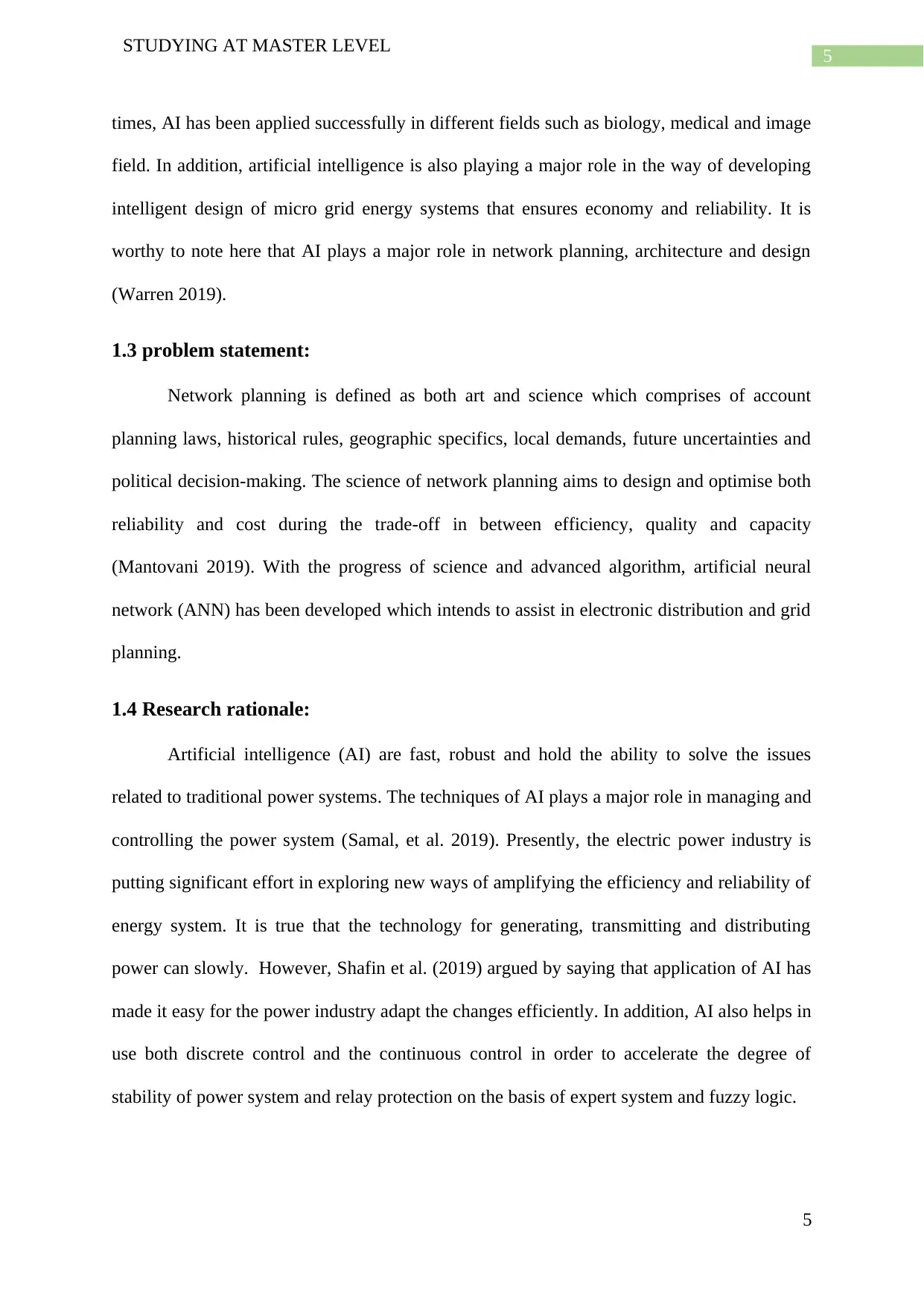
5
STUDYING AT MASTER LEVEL
times, AI has been applied successfully in different fields such as biology, medical and image
field. In addition, artificial intelligence is also playing a major role in the way of developing
intelligent design of micro grid energy systems that ensures economy and reliability. It is
worthy to note here that AI plays a major role in network planning, architecture and design
(Warren 2019).
1.3 problem statement:
Network planning is defined as both art and science which comprises of account
planning laws, historical rules, geographic specifics, local demands, future uncertainties and
political decision-making. The science of network planning aims to design and optimise both
reliability and cost during the trade-off in between efficiency, quality and capacity
(Mantovani 2019). With the progress of science and advanced algorithm, artificial neural
network (ANN) has been developed which intends to assist in electronic distribution and grid
planning.
1.4 Research rationale:
Artificial intelligence (AI) are fast, robust and hold the ability to solve the issues
related to traditional power systems. The techniques of AI plays a major role in managing and
controlling the power system (Samal, et al. 2019). Presently, the electric power industry is
putting significant effort in exploring new ways of amplifying the efficiency and reliability of
energy system. It is true that the technology for generating, transmitting and distributing
power can slowly. However, Shafin et al. (2019) argued by saying that application of AI has
made it easy for the power industry adapt the changes efficiently. In addition, AI also helps in
use both discrete control and the continuous control in order to accelerate the degree of
stability of power system and relay protection on the basis of expert system and fuzzy logic.
5
STUDYING AT MASTER LEVEL
times, AI has been applied successfully in different fields such as biology, medical and image
field. In addition, artificial intelligence is also playing a major role in the way of developing
intelligent design of micro grid energy systems that ensures economy and reliability. It is
worthy to note here that AI plays a major role in network planning, architecture and design
(Warren 2019).
1.3 problem statement:
Network planning is defined as both art and science which comprises of account
planning laws, historical rules, geographic specifics, local demands, future uncertainties and
political decision-making. The science of network planning aims to design and optimise both
reliability and cost during the trade-off in between efficiency, quality and capacity
(Mantovani 2019). With the progress of science and advanced algorithm, artificial neural
network (ANN) has been developed which intends to assist in electronic distribution and grid
planning.
1.4 Research rationale:
Artificial intelligence (AI) are fast, robust and hold the ability to solve the issues
related to traditional power systems. The techniques of AI plays a major role in managing and
controlling the power system (Samal, et al. 2019). Presently, the electric power industry is
putting significant effort in exploring new ways of amplifying the efficiency and reliability of
energy system. It is true that the technology for generating, transmitting and distributing
power can slowly. However, Shafin et al. (2019) argued by saying that application of AI has
made it easy for the power industry adapt the changes efficiently. In addition, AI also helps in
use both discrete control and the continuous control in order to accelerate the degree of
stability of power system and relay protection on the basis of expert system and fuzzy logic.
5
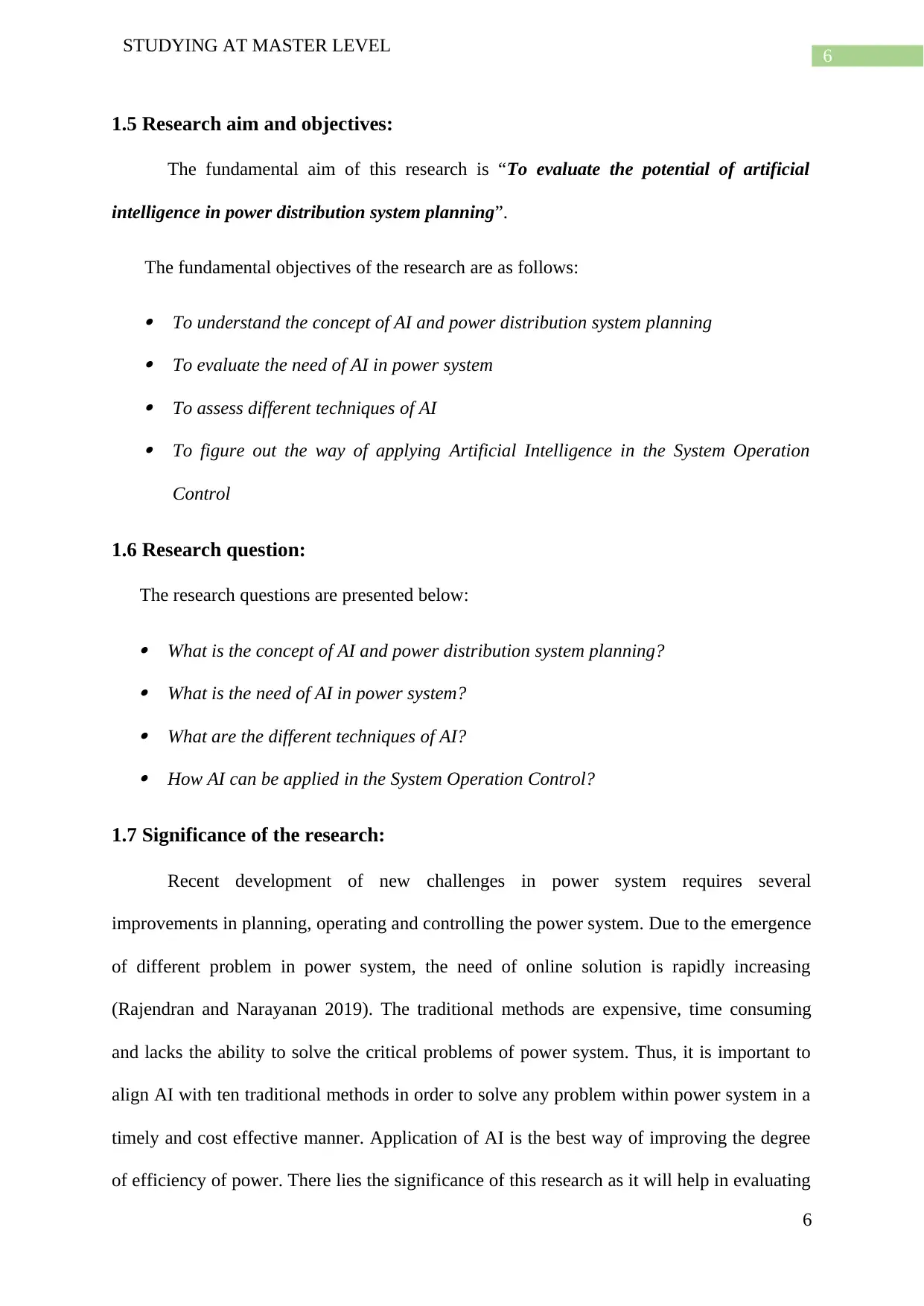
6
STUDYING AT MASTER LEVEL
1.5 Research aim and objectives:
The fundamental aim of this research is “To evaluate the potential of artificial
intelligence in power distribution system planning”.
The fundamental objectives of the research are as follows:
To understand the concept of AI and power distribution system planning To evaluate the need of AI in power system To assess different techniques of AI To figure out the way of applying Artificial Intelligence in the System Operation
Control
1.6 Research question:
The research questions are presented below:
What is the concept of AI and power distribution system planning? What is the need of AI in power system? What are the different techniques of AI? How AI can be applied in the System Operation Control?
1.7 Significance of the research:
Recent development of new challenges in power system requires several
improvements in planning, operating and controlling the power system. Due to the emergence
of different problem in power system, the need of online solution is rapidly increasing
(Rajendran and Narayanan 2019). The traditional methods are expensive, time consuming
and lacks the ability to solve the critical problems of power system. Thus, it is important to
align AI with ten traditional methods in order to solve any problem within power system in a
timely and cost effective manner. Application of AI is the best way of improving the degree
of efficiency of power. There lies the significance of this research as it will help in evaluating
6
STUDYING AT MASTER LEVEL
1.5 Research aim and objectives:
The fundamental aim of this research is “To evaluate the potential of artificial
intelligence in power distribution system planning”.
The fundamental objectives of the research are as follows:
To understand the concept of AI and power distribution system planning To evaluate the need of AI in power system To assess different techniques of AI To figure out the way of applying Artificial Intelligence in the System Operation
Control
1.6 Research question:
The research questions are presented below:
What is the concept of AI and power distribution system planning? What is the need of AI in power system? What are the different techniques of AI? How AI can be applied in the System Operation Control?
1.7 Significance of the research:
Recent development of new challenges in power system requires several
improvements in planning, operating and controlling the power system. Due to the emergence
of different problem in power system, the need of online solution is rapidly increasing
(Rajendran and Narayanan 2019). The traditional methods are expensive, time consuming
and lacks the ability to solve the critical problems of power system. Thus, it is important to
align AI with ten traditional methods in order to solve any problem within power system in a
timely and cost effective manner. Application of AI is the best way of improving the degree
of efficiency of power. There lies the significance of this research as it will help in evaluating
6
⊘ This is a preview!⊘
Do you want full access?
Subscribe today to unlock all pages.

Trusted by 1+ million students worldwide
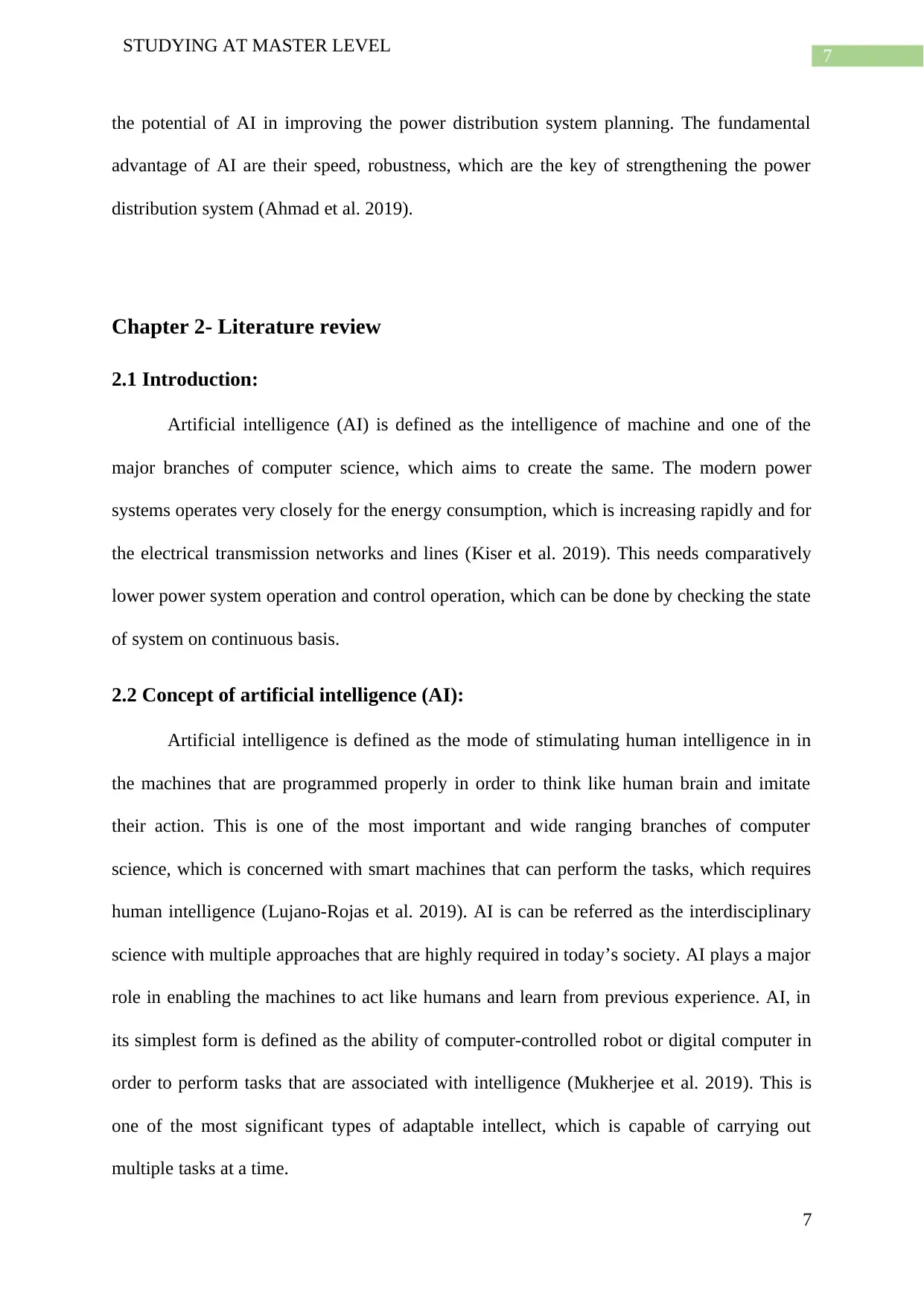
7
STUDYING AT MASTER LEVEL
the potential of AI in improving the power distribution system planning. The fundamental
advantage of AI are their speed, robustness, which are the key of strengthening the power
distribution system (Ahmad et al. 2019).
Chapter 2- Literature review
2.1 Introduction:
Artificial intelligence (AI) is defined as the intelligence of machine and one of the
major branches of computer science, which aims to create the same. The modern power
systems operates very closely for the energy consumption, which is increasing rapidly and for
the electrical transmission networks and lines (Kiser et al. 2019). This needs comparatively
lower power system operation and control operation, which can be done by checking the state
of system on continuous basis.
2.2 Concept of artificial intelligence (AI):
Artificial intelligence is defined as the mode of stimulating human intelligence in in
the machines that are programmed properly in order to think like human brain and imitate
their action. This is one of the most important and wide ranging branches of computer
science, which is concerned with smart machines that can perform the tasks, which requires
human intelligence (Lujano-Rojas et al. 2019). AI is can be referred as the interdisciplinary
science with multiple approaches that are highly required in today’s society. AI plays a major
role in enabling the machines to act like humans and learn from previous experience. AI, in
its simplest form is defined as the ability of computer-controlled robot or digital computer in
order to perform tasks that are associated with intelligence (Mukherjee et al. 2019). This is
one of the most significant types of adaptable intellect, which is capable of carrying out
multiple tasks at a time.
7
STUDYING AT MASTER LEVEL
the potential of AI in improving the power distribution system planning. The fundamental
advantage of AI are their speed, robustness, which are the key of strengthening the power
distribution system (Ahmad et al. 2019).
Chapter 2- Literature review
2.1 Introduction:
Artificial intelligence (AI) is defined as the intelligence of machine and one of the
major branches of computer science, which aims to create the same. The modern power
systems operates very closely for the energy consumption, which is increasing rapidly and for
the electrical transmission networks and lines (Kiser et al. 2019). This needs comparatively
lower power system operation and control operation, which can be done by checking the state
of system on continuous basis.
2.2 Concept of artificial intelligence (AI):
Artificial intelligence is defined as the mode of stimulating human intelligence in in
the machines that are programmed properly in order to think like human brain and imitate
their action. This is one of the most important and wide ranging branches of computer
science, which is concerned with smart machines that can perform the tasks, which requires
human intelligence (Lujano-Rojas et al. 2019). AI is can be referred as the interdisciplinary
science with multiple approaches that are highly required in today’s society. AI plays a major
role in enabling the machines to act like humans and learn from previous experience. AI, in
its simplest form is defined as the ability of computer-controlled robot or digital computer in
order to perform tasks that are associated with intelligence (Mukherjee et al. 2019). This is
one of the most significant types of adaptable intellect, which is capable of carrying out
multiple tasks at a time.
7
Paraphrase This Document
Need a fresh take? Get an instant paraphrase of this document with our AI Paraphraser
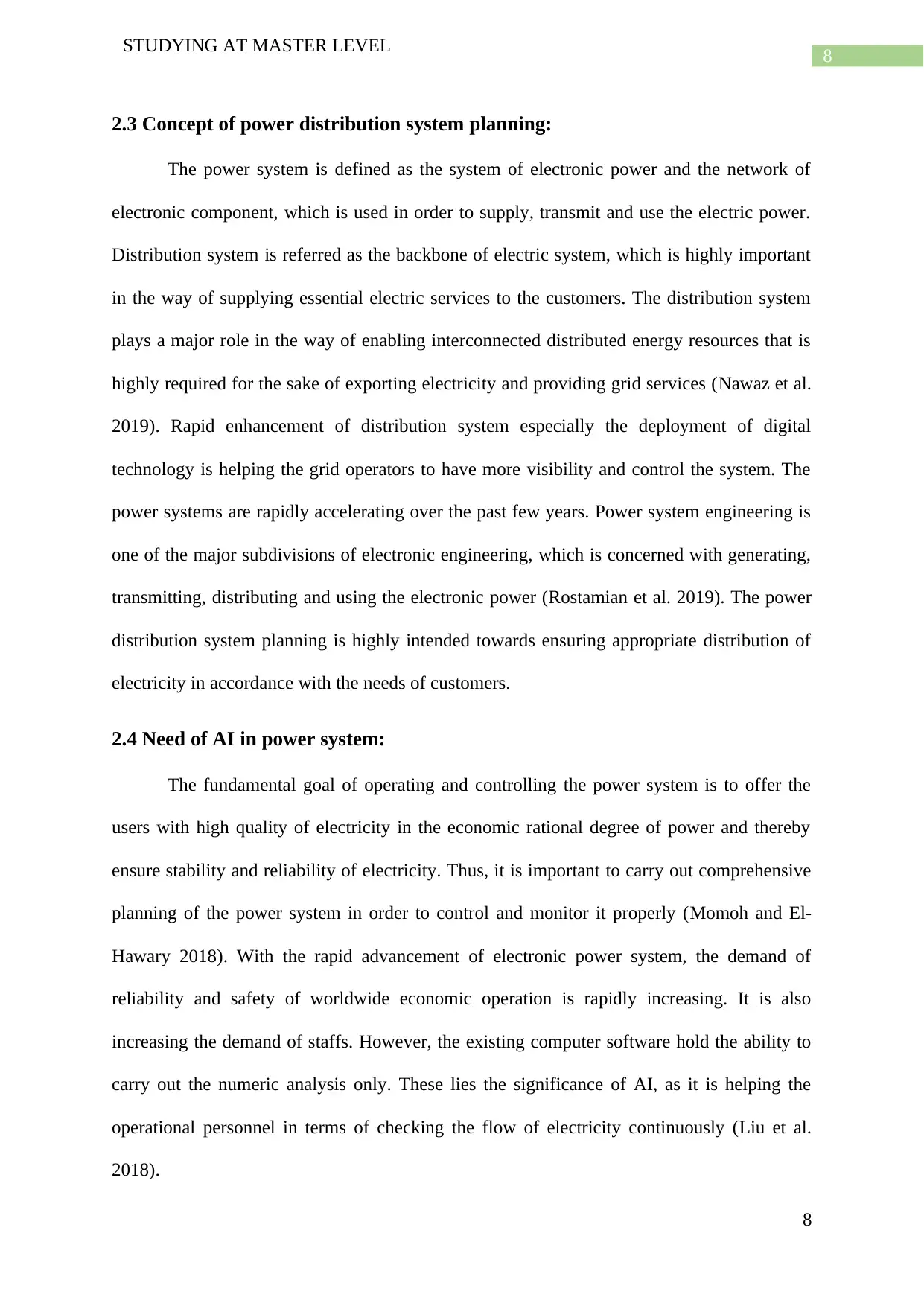
8
STUDYING AT MASTER LEVEL
2.3 Concept of power distribution system planning:
The power system is defined as the system of electronic power and the network of
electronic component, which is used in order to supply, transmit and use the electric power.
Distribution system is referred as the backbone of electric system, which is highly important
in the way of supplying essential electric services to the customers. The distribution system
plays a major role in the way of enabling interconnected distributed energy resources that is
highly required for the sake of exporting electricity and providing grid services (Nawaz et al.
2019). Rapid enhancement of distribution system especially the deployment of digital
technology is helping the grid operators to have more visibility and control the system. The
power systems are rapidly accelerating over the past few years. Power system engineering is
one of the major subdivisions of electronic engineering, which is concerned with generating,
transmitting, distributing and using the electronic power (Rostamian et al. 2019). The power
distribution system planning is highly intended towards ensuring appropriate distribution of
electricity in accordance with the needs of customers.
2.4 Need of AI in power system:
The fundamental goal of operating and controlling the power system is to offer the
users with high quality of electricity in the economic rational degree of power and thereby
ensure stability and reliability of electricity. Thus, it is important to carry out comprehensive
planning of the power system in order to control and monitor it properly (Momoh and El-
Hawary 2018). With the rapid advancement of electronic power system, the demand of
reliability and safety of worldwide economic operation is rapidly increasing. It is also
increasing the demand of staffs. However, the existing computer software hold the ability to
carry out the numeric analysis only. These lies the significance of AI, as it is helping the
operational personnel in terms of checking the flow of electricity continuously (Liu et al.
2018).
8
STUDYING AT MASTER LEVEL
2.3 Concept of power distribution system planning:
The power system is defined as the system of electronic power and the network of
electronic component, which is used in order to supply, transmit and use the electric power.
Distribution system is referred as the backbone of electric system, which is highly important
in the way of supplying essential electric services to the customers. The distribution system
plays a major role in the way of enabling interconnected distributed energy resources that is
highly required for the sake of exporting electricity and providing grid services (Nawaz et al.
2019). Rapid enhancement of distribution system especially the deployment of digital
technology is helping the grid operators to have more visibility and control the system. The
power systems are rapidly accelerating over the past few years. Power system engineering is
one of the major subdivisions of electronic engineering, which is concerned with generating,
transmitting, distributing and using the electronic power (Rostamian et al. 2019). The power
distribution system planning is highly intended towards ensuring appropriate distribution of
electricity in accordance with the needs of customers.
2.4 Need of AI in power system:
The fundamental goal of operating and controlling the power system is to offer the
users with high quality of electricity in the economic rational degree of power and thereby
ensure stability and reliability of electricity. Thus, it is important to carry out comprehensive
planning of the power system in order to control and monitor it properly (Momoh and El-
Hawary 2018). With the rapid advancement of electronic power system, the demand of
reliability and safety of worldwide economic operation is rapidly increasing. It is also
increasing the demand of staffs. However, the existing computer software hold the ability to
carry out the numeric analysis only. These lies the significance of AI, as it is helping the
operational personnel in terms of checking the flow of electricity continuously (Liu et al.
2018).
8
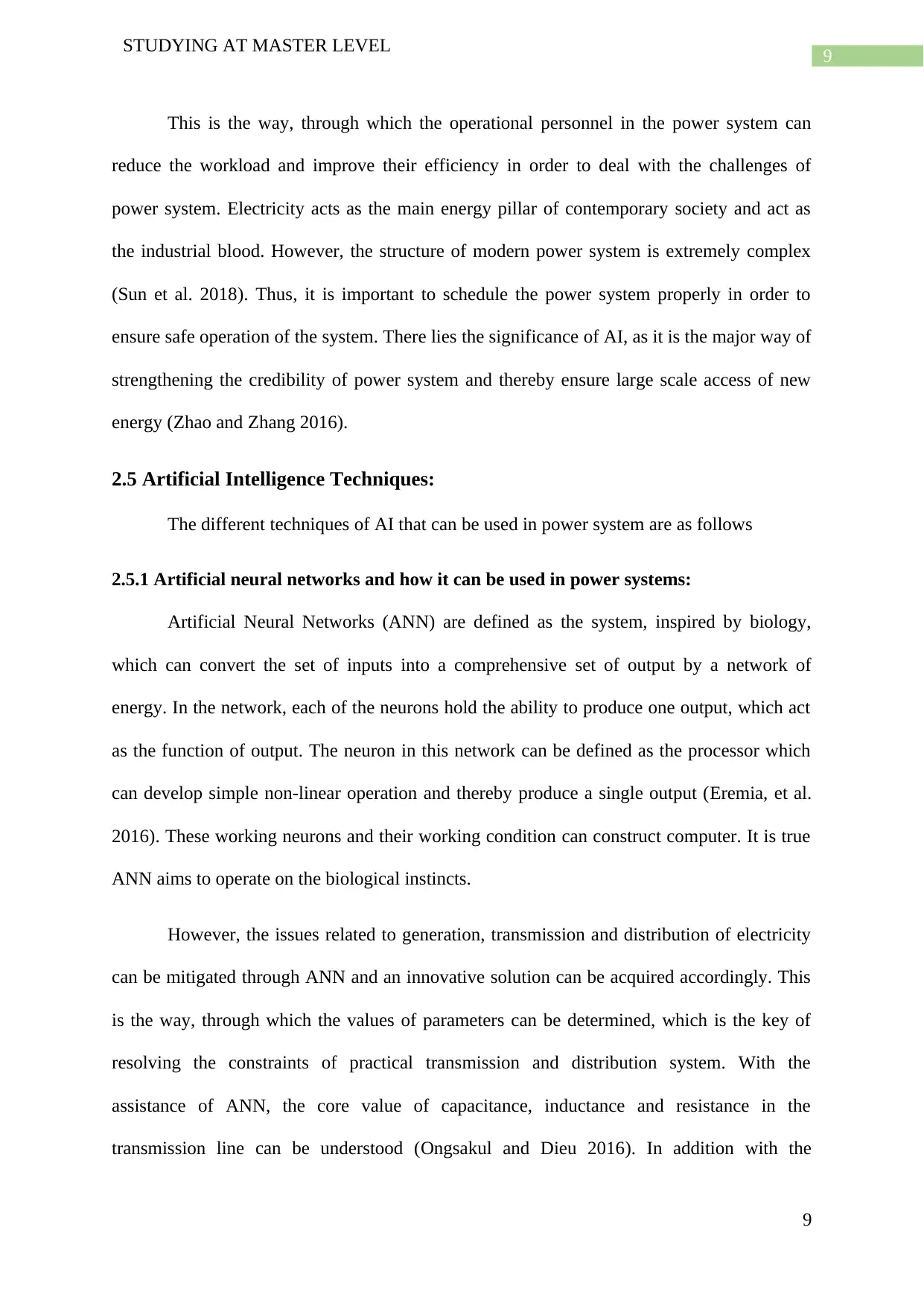
9
STUDYING AT MASTER LEVEL
This is the way, through which the operational personnel in the power system can
reduce the workload and improve their efficiency in order to deal with the challenges of
power system. Electricity acts as the main energy pillar of contemporary society and act as
the industrial blood. However, the structure of modern power system is extremely complex
(Sun et al. 2018). Thus, it is important to schedule the power system properly in order to
ensure safe operation of the system. There lies the significance of AI, as it is the major way of
strengthening the credibility of power system and thereby ensure large scale access of new
energy (Zhao and Zhang 2016).
2.5 Artificial Intelligence Techniques:
The different techniques of AI that can be used in power system are as follows
2.5.1 Artificial neural networks and how it can be used in power systems:
Artificial Neural Networks (ANN) are defined as the system, inspired by biology,
which can convert the set of inputs into a comprehensive set of output by a network of
energy. In the network, each of the neurons hold the ability to produce one output, which act
as the function of output. The neuron in this network can be defined as the processor which
can develop simple non-linear operation and thereby produce a single output (Eremia, et al.
2016). These working neurons and their working condition can construct computer. It is true
ANN aims to operate on the biological instincts.
However, the issues related to generation, transmission and distribution of electricity
can be mitigated through ANN and an innovative solution can be acquired accordingly. This
is the way, through which the values of parameters can be determined, which is the key of
resolving the constraints of practical transmission and distribution system. With the
assistance of ANN, the core value of capacitance, inductance and resistance in the
transmission line can be understood (Ongsakul and Dieu 2016). In addition with the
9
STUDYING AT MASTER LEVEL
This is the way, through which the operational personnel in the power system can
reduce the workload and improve their efficiency in order to deal with the challenges of
power system. Electricity acts as the main energy pillar of contemporary society and act as
the industrial blood. However, the structure of modern power system is extremely complex
(Sun et al. 2018). Thus, it is important to schedule the power system properly in order to
ensure safe operation of the system. There lies the significance of AI, as it is the major way of
strengthening the credibility of power system and thereby ensure large scale access of new
energy (Zhao and Zhang 2016).
2.5 Artificial Intelligence Techniques:
The different techniques of AI that can be used in power system are as follows
2.5.1 Artificial neural networks and how it can be used in power systems:
Artificial Neural Networks (ANN) are defined as the system, inspired by biology,
which can convert the set of inputs into a comprehensive set of output by a network of
energy. In the network, each of the neurons hold the ability to produce one output, which act
as the function of output. The neuron in this network can be defined as the processor which
can develop simple non-linear operation and thereby produce a single output (Eremia, et al.
2016). These working neurons and their working condition can construct computer. It is true
ANN aims to operate on the biological instincts.
However, the issues related to generation, transmission and distribution of electricity
can be mitigated through ANN and an innovative solution can be acquired accordingly. This
is the way, through which the values of parameters can be determined, which is the key of
resolving the constraints of practical transmission and distribution system. With the
assistance of ANN, the core value of capacitance, inductance and resistance in the
transmission line can be understood (Ongsakul and Dieu 2016). In addition with the
9
⊘ This is a preview!⊘
Do you want full access?
Subscribe today to unlock all pages.

Trusted by 1+ million students worldwide
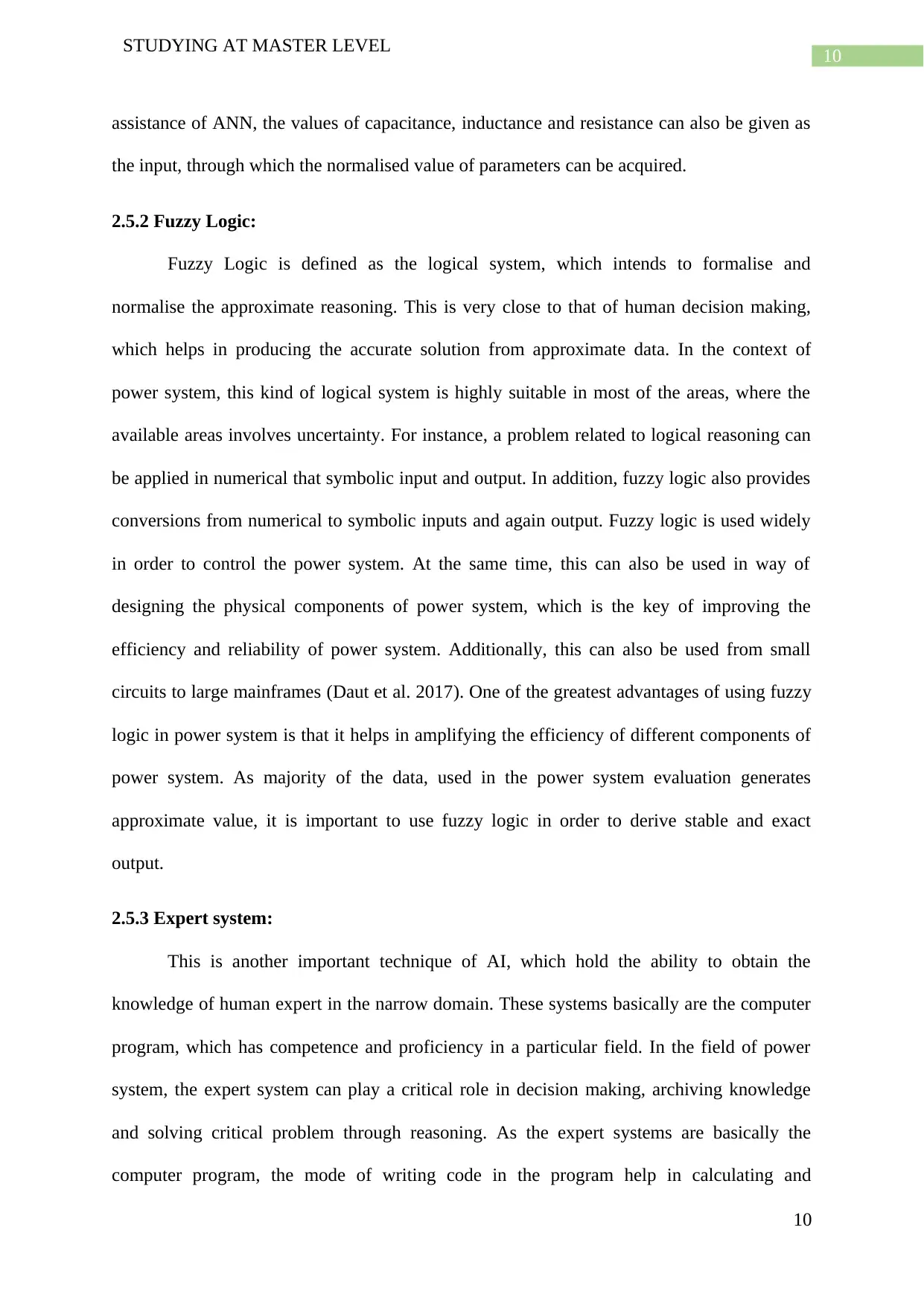
10
STUDYING AT MASTER LEVEL
assistance of ANN, the values of capacitance, inductance and resistance can also be given as
the input, through which the normalised value of parameters can be acquired.
2.5.2 Fuzzy Logic:
Fuzzy Logic is defined as the logical system, which intends to formalise and
normalise the approximate reasoning. This is very close to that of human decision making,
which helps in producing the accurate solution from approximate data. In the context of
power system, this kind of logical system is highly suitable in most of the areas, where the
available areas involves uncertainty. For instance, a problem related to logical reasoning can
be applied in numerical that symbolic input and output. In addition, fuzzy logic also provides
conversions from numerical to symbolic inputs and again output. Fuzzy logic is used widely
in order to control the power system. At the same time, this can also be used in way of
designing the physical components of power system, which is the key of improving the
efficiency and reliability of power system. Additionally, this can also be used from small
circuits to large mainframes (Daut et al. 2017). One of the greatest advantages of using fuzzy
logic in power system is that it helps in amplifying the efficiency of different components of
power system. As majority of the data, used in the power system evaluation generates
approximate value, it is important to use fuzzy logic in order to derive stable and exact
output.
2.5.3 Expert system:
This is another important technique of AI, which hold the ability to obtain the
knowledge of human expert in the narrow domain. These systems basically are the computer
program, which has competence and proficiency in a particular field. In the field of power
system, the expert system can play a critical role in decision making, archiving knowledge
and solving critical problem through reasoning. As the expert systems are basically the
computer program, the mode of writing code in the program help in calculating and
10
STUDYING AT MASTER LEVEL
assistance of ANN, the values of capacitance, inductance and resistance can also be given as
the input, through which the normalised value of parameters can be acquired.
2.5.2 Fuzzy Logic:
Fuzzy Logic is defined as the logical system, which intends to formalise and
normalise the approximate reasoning. This is very close to that of human decision making,
which helps in producing the accurate solution from approximate data. In the context of
power system, this kind of logical system is highly suitable in most of the areas, where the
available areas involves uncertainty. For instance, a problem related to logical reasoning can
be applied in numerical that symbolic input and output. In addition, fuzzy logic also provides
conversions from numerical to symbolic inputs and again output. Fuzzy logic is used widely
in order to control the power system. At the same time, this can also be used in way of
designing the physical components of power system, which is the key of improving the
efficiency and reliability of power system. Additionally, this can also be used from small
circuits to large mainframes (Daut et al. 2017). One of the greatest advantages of using fuzzy
logic in power system is that it helps in amplifying the efficiency of different components of
power system. As majority of the data, used in the power system evaluation generates
approximate value, it is important to use fuzzy logic in order to derive stable and exact
output.
2.5.3 Expert system:
This is another important technique of AI, which hold the ability to obtain the
knowledge of human expert in the narrow domain. These systems basically are the computer
program, which has competence and proficiency in a particular field. In the field of power
system, the expert system can play a critical role in decision making, archiving knowledge
and solving critical problem through reasoning. As the expert systems are basically the
computer program, the mode of writing code in the program help in calculating and
10
Paraphrase This Document
Need a fresh take? Get an instant paraphrase of this document with our AI Paraphraser
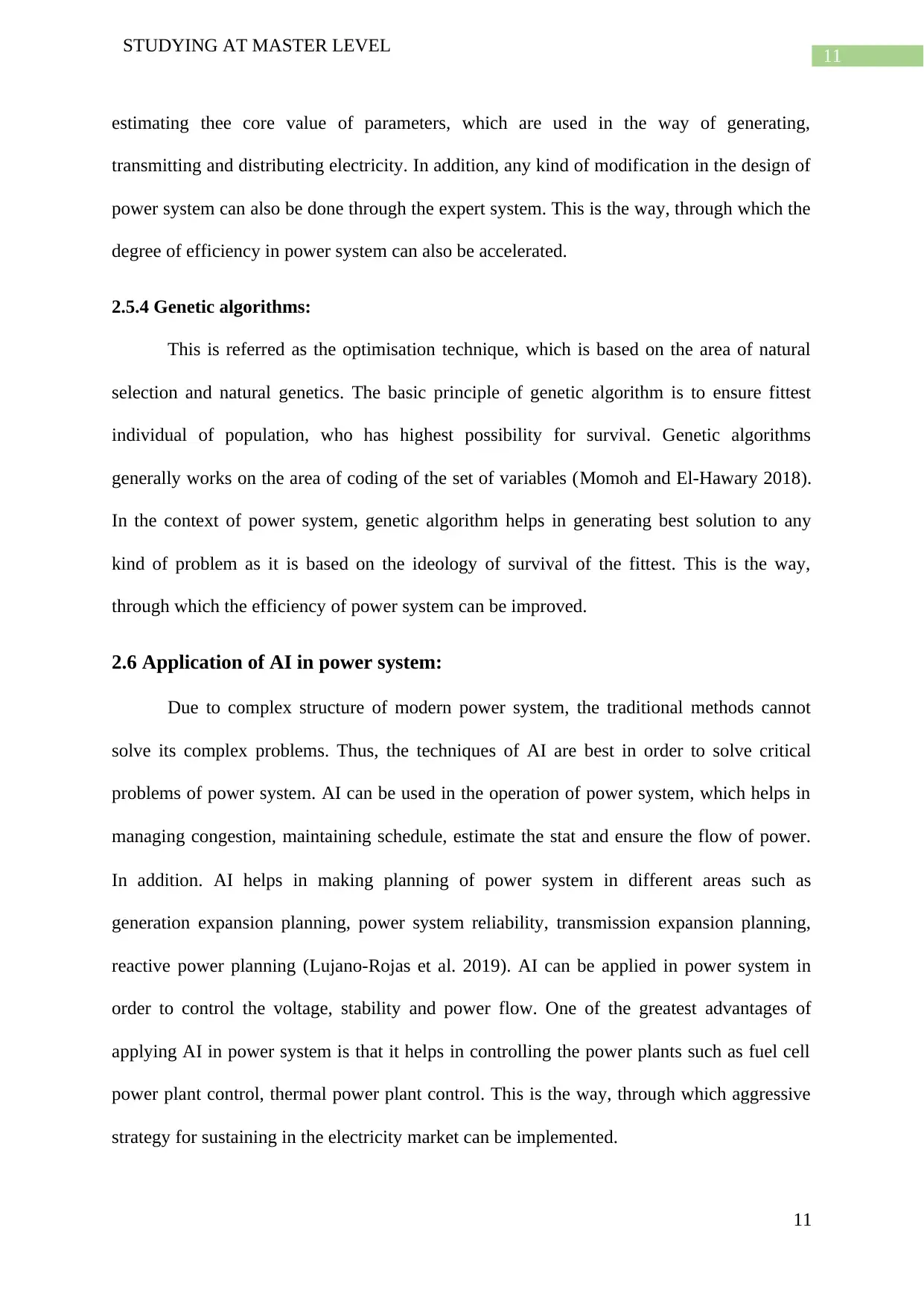
11
STUDYING AT MASTER LEVEL
estimating thee core value of parameters, which are used in the way of generating,
transmitting and distributing electricity. In addition, any kind of modification in the design of
power system can also be done through the expert system. This is the way, through which the
degree of efficiency in power system can also be accelerated.
2.5.4 Genetic algorithms:
This is referred as the optimisation technique, which is based on the area of natural
selection and natural genetics. The basic principle of genetic algorithm is to ensure fittest
individual of population, who has highest possibility for survival. Genetic algorithms
generally works on the area of coding of the set of variables (Momoh and El-Hawary 2018).
In the context of power system, genetic algorithm helps in generating best solution to any
kind of problem as it is based on the ideology of survival of the fittest. This is the way,
through which the efficiency of power system can be improved.
2.6 Application of AI in power system:
Due to complex structure of modern power system, the traditional methods cannot
solve its complex problems. Thus, the techniques of AI are best in order to solve critical
problems of power system. AI can be used in the operation of power system, which helps in
managing congestion, maintaining schedule, estimate the stat and ensure the flow of power.
In addition. AI helps in making planning of power system in different areas such as
generation expansion planning, power system reliability, transmission expansion planning,
reactive power planning (Lujano-Rojas et al. 2019). AI can be applied in power system in
order to control the voltage, stability and power flow. One of the greatest advantages of
applying AI in power system is that it helps in controlling the power plants such as fuel cell
power plant control, thermal power plant control. This is the way, through which aggressive
strategy for sustaining in the electricity market can be implemented.
11
STUDYING AT MASTER LEVEL
estimating thee core value of parameters, which are used in the way of generating,
transmitting and distributing electricity. In addition, any kind of modification in the design of
power system can also be done through the expert system. This is the way, through which the
degree of efficiency in power system can also be accelerated.
2.5.4 Genetic algorithms:
This is referred as the optimisation technique, which is based on the area of natural
selection and natural genetics. The basic principle of genetic algorithm is to ensure fittest
individual of population, who has highest possibility for survival. Genetic algorithms
generally works on the area of coding of the set of variables (Momoh and El-Hawary 2018).
In the context of power system, genetic algorithm helps in generating best solution to any
kind of problem as it is based on the ideology of survival of the fittest. This is the way,
through which the efficiency of power system can be improved.
2.6 Application of AI in power system:
Due to complex structure of modern power system, the traditional methods cannot
solve its complex problems. Thus, the techniques of AI are best in order to solve critical
problems of power system. AI can be used in the operation of power system, which helps in
managing congestion, maintaining schedule, estimate the stat and ensure the flow of power.
In addition. AI helps in making planning of power system in different areas such as
generation expansion planning, power system reliability, transmission expansion planning,
reactive power planning (Lujano-Rojas et al. 2019). AI can be applied in power system in
order to control the voltage, stability and power flow. One of the greatest advantages of
applying AI in power system is that it helps in controlling the power plants such as fuel cell
power plant control, thermal power plant control. This is the way, through which aggressive
strategy for sustaining in the electricity market can be implemented.
11
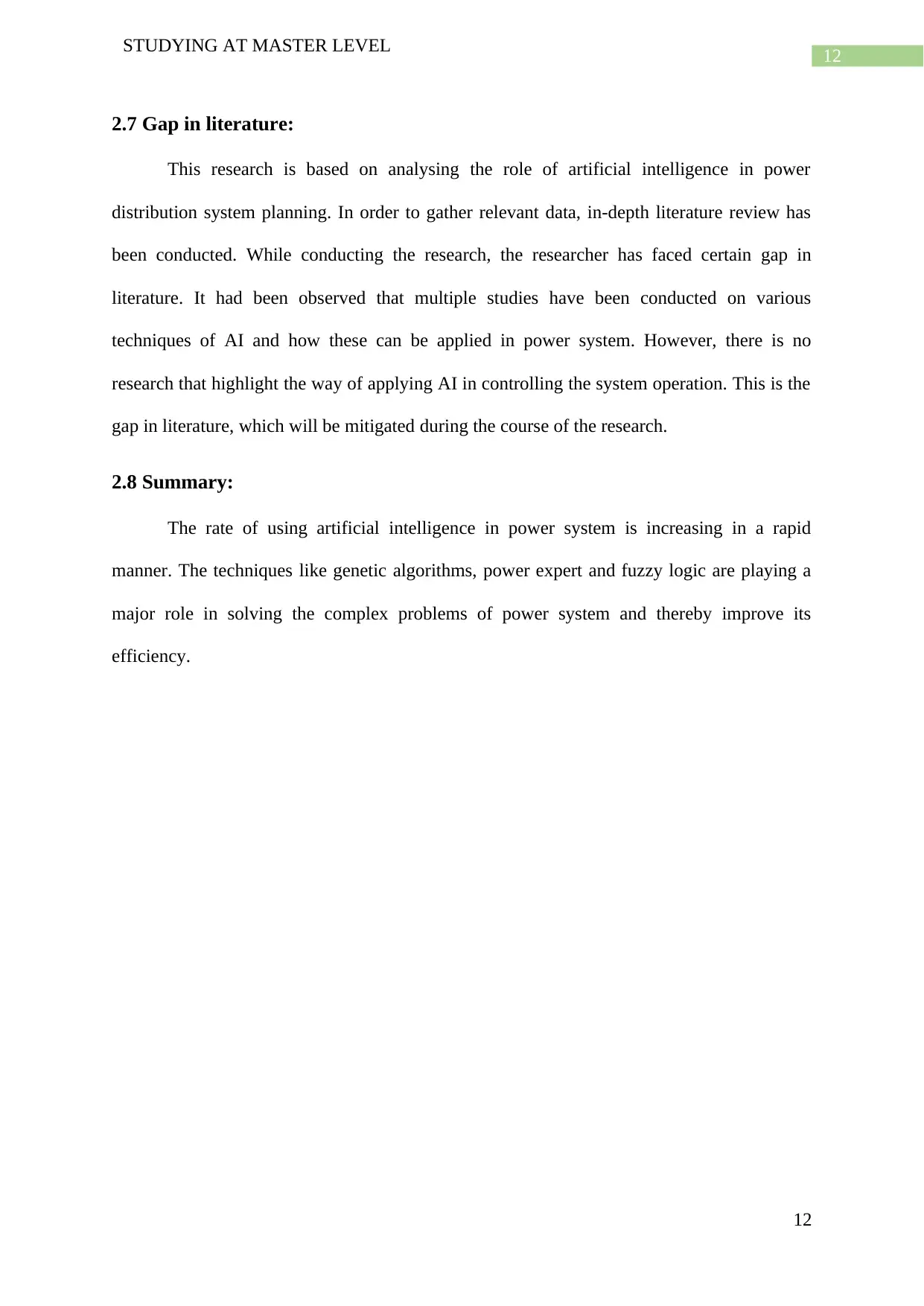
12
STUDYING AT MASTER LEVEL
2.7 Gap in literature:
This research is based on analysing the role of artificial intelligence in power
distribution system planning. In order to gather relevant data, in-depth literature review has
been conducted. While conducting the research, the researcher has faced certain gap in
literature. It had been observed that multiple studies have been conducted on various
techniques of AI and how these can be applied in power system. However, there is no
research that highlight the way of applying AI in controlling the system operation. This is the
gap in literature, which will be mitigated during the course of the research.
2.8 Summary:
The rate of using artificial intelligence in power system is increasing in a rapid
manner. The techniques like genetic algorithms, power expert and fuzzy logic are playing a
major role in solving the complex problems of power system and thereby improve its
efficiency.
12
STUDYING AT MASTER LEVEL
2.7 Gap in literature:
This research is based on analysing the role of artificial intelligence in power
distribution system planning. In order to gather relevant data, in-depth literature review has
been conducted. While conducting the research, the researcher has faced certain gap in
literature. It had been observed that multiple studies have been conducted on various
techniques of AI and how these can be applied in power system. However, there is no
research that highlight the way of applying AI in controlling the system operation. This is the
gap in literature, which will be mitigated during the course of the research.
2.8 Summary:
The rate of using artificial intelligence in power system is increasing in a rapid
manner. The techniques like genetic algorithms, power expert and fuzzy logic are playing a
major role in solving the complex problems of power system and thereby improve its
efficiency.
12
⊘ This is a preview!⊘
Do you want full access?
Subscribe today to unlock all pages.

Trusted by 1+ million students worldwide
1 out of 19
Related Documents
Your All-in-One AI-Powered Toolkit for Academic Success.
+13062052269
info@desklib.com
Available 24*7 on WhatsApp / Email
![[object Object]](/_next/static/media/star-bottom.7253800d.svg)
Unlock your academic potential
Copyright © 2020–2026 A2Z Services. All Rights Reserved. Developed and managed by ZUCOL.





